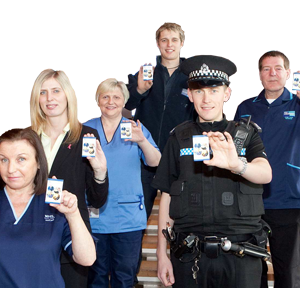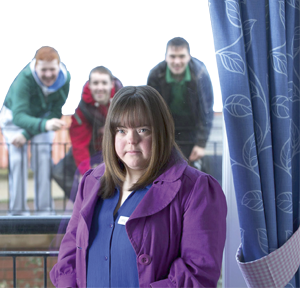What happens when harm is reported?
The support and protection of adults at risk is the responsibility of everyone, including members of the public, professionals, all statutory agencies, public bodies, voluntary and private providers. Effective communication and joint working is therefore key to the prevention of harm.
The opportunity for harm is reduced by making sure that adults are empowered and supported to make their own choices about their lives and to live as independently as possible.
The Adult Support and Protection (Scotland) Act 2007 gives councils and in particular Social Work Resources lead responsibility for inquiring and investigating into the circumstances of adults at risk who are being harmed. Employees such as Police, NHS staff and the Council, have a duty to report their concerns to social work if they know or believe an adult is at risk of harm.
Inquiry without Investigative Actions
The Act places a duty on councils to make inquiries about a person's well-being, property or financial affairs if it knows or believes:
- that the person is an adult at risk; and
- that it might need to intervene (under the Act or otherwise) in order to protect the person's well-being, property or financial affairs
Inquiries under Section 4 of the Act will be carried out by the council's social work services, however other professionals, such as the Police, the Care Inspectorate or health professionals may be asked to assist. Many different professionals in statutory agencies and other organisations have contact with adults at risk of harm including social workers, medical and nursing staff and other health professionals, staff delivering care services, Procurators Fiscal, the police and staff of voluntary organisations. A multi-agency and multi-disciplinary approach is therefore appropriate.
The responsible Social Work Manager will decide - using information gathered from the Inquiry, professional judgement, liaison with other agencies and evidence-based practice - on how best to proceed with the referral.
Inquiry with Investigative Actions
An adult protection inquiry with investigative actions, will contain any or all of the following elements, all of which require the involvement of a council officer:
- a visit
- an interview with the adult
- a medical examination of the adult
- the examination of records (when social work is investigating concerns of financial abuse, under Section 10 of the Act, the Council can request any person holding ‘health, financial or other records relating to an individual whom the council officer (social worker) knows or believes to be an adult at risk to give access to the records or copies of them to the officer of the council.’ These requests will normally be made in writing. Both the Office of Public Guardian and the Council have a duty to protect adults at risk of financial harm. When financial harm is suspected for example, when someone is misusing their Power of Attorney or Guardianship Order the Council will work in partnership with the Office of Public Guardian to investigate the concerns)
Case Conference
An Adult Support and Protection Case Conference is a meeting involving the adult and everyone who is concerned about them. It is held to share information and make decisions about how to support and protect an adult deemed to be at risk in circumstances where harm has occurred or is suspected. The adult should, where possible, be invited to contribute as fully as possible. The adult can choose if they wish to attend or not to attend the case conference, agree or disagree with what is being suggested and have their views recorded.
Protection Planning
The Case Conference will decide if a Protection Plan is needed. The Protection Plan is an agreed plan of what help and support the adult needs to keep safe from harm. The adult will be involved in their plan and with their agreement, their family and friends can be too. The plan will be reviewed regularly. If it is not working, or the adult’s situation changes, another case conference will be arranged.
Adult’s Rights
Essentially, adult protection is about balancing the adults right to make choices about their lives with a legal duty to protect them. There are certain rights enshrined within the Adult Support and Protection (Scotland) Act 2007 that must be respected when intervening in ‘adult at risk’ circumstances. The Act also has overarching principles which must be considered in relation to any intervention in the life of an adult at risk.
A public body or office holder must be satisfied that any intervention will provide:
- Benefit to the adult
- Be the least restrictive to the adult’s freedom of the range of options available
In addition, the public bodies or office holders must also have regard to the following principles:
- Consideration must be given to the wishes of the adult;
- The views of others, the adult’s nearest relative, primary carer, guardian, attorney or other person, who has an interest in the adult’s well-being or property;
- The importance of the adult participating as full as possible and providing them with such information and support to enable them to participate;
- Ensuring that the adult is not treated less favourably than any other adult in a comparable situation; and
- Due regard given to the adult’s abilities, background and characteristics.
An 'adult at risk' has the right to refuse to co-operate with the Social Worker (Council Officer) during the Inquiry with and/or without investigative actions. The adult can refuse to answer any, all or some questions put to them and can also refuse to be medically examined.
Please remember, the consent of an adult is NOT required when reporting harm or making a referral to Social Work.
Advocacy
Where a report of possible harm has been made, the adult at risk may require an advocate to support them through the adult protection process.
Sometimes it may be challenging for a person to make themselves heard, understood and accepted. There can be many reasons for this. Advocacy provides people with a voice, ensures their needs and wishes are known, views are respected and rights protected. Advocacy is closely linked to the principles of human rights, discrimination, equality of opportunities and the social model of disability.
In South Lanarkshire the contracted advocacy service is: Equal Say. Equal Say is a registered charity and an independent organisation with their own Board of Management. Their independence means they are loyal only to the people they represent and they strive to be as free as they can from any conflicts of interest.



